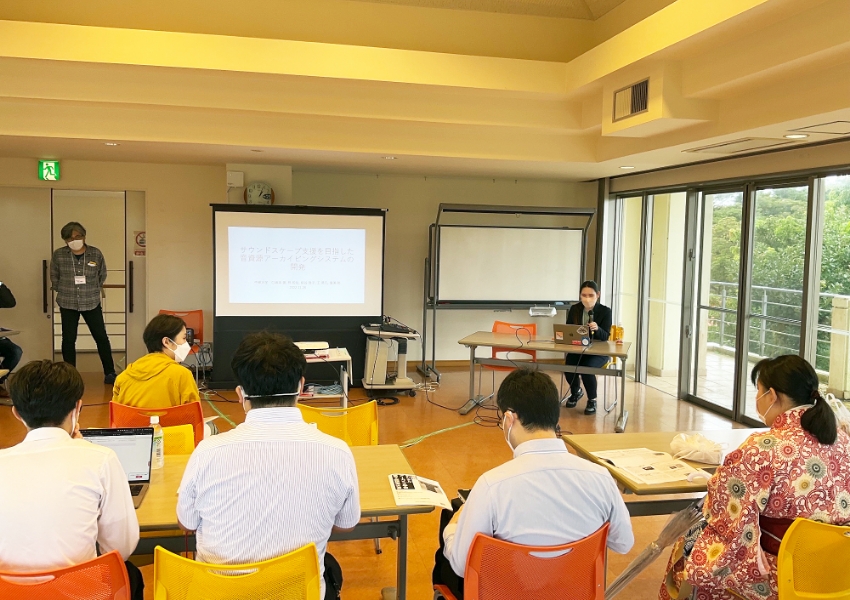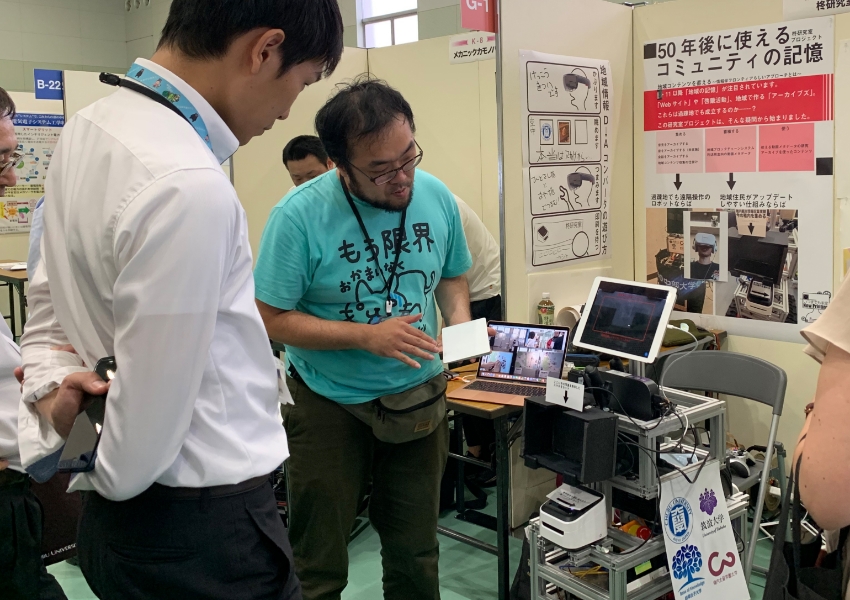About the Graduate School of Global Humanics
Developping specialists with a high level of expertise and flexible collaborative skills.
Understanding the diverse and complex international society from a global perspective is very important for global citizens.
On the other hand, globalization has widely permeated our local daily lives, and it is now commonplace to live in the same neighborhoods and work in the same offices with people of different ethnicities and diverse cultural backgrounds.
Deepening our understanding of different cultures and international society is essential for us to live in a multicultural society.
At the same time, an interest in the local community in which one lives will become increasingly important, and this will require a deep interest in diverse people and cultures.
Based on this recognition, the graduate school has a philosophy of “glocal” education and research that is centered on both global and local perspectives.
In addition, society is undergoing a major transition with the rapid progress of digitalization.
The impact is being seen in many areas, including business and civic life.
AI will make it possible to analyze large amounts of data, but it is important to know what to read from the data, or in other words, to have the ability to search for the essence of things as well as the ability to process information in a society overflowing with information. The Graduate School of Global Humanics aims to nurture individuals with a broad international perspective, a deep interest in humanity, and a high degree of specialization combined with flexible collaborative skills.
Majors
Department of International Relations: Master’s Course / Doctoral Course
The Department of International Relations cultivates the ability to analyze and understand the global society from political-economic and socio-cultural perspectives, and addresses the research question of how human beings and society should develop sustainably.
The objective of this department is to develop globalized citizens, advanced professionals, knowledgeable members of society, and educational researchers with a good balance of theory and practical application through critical thinking skills and connections to authentic situations.
The lectures in the Master’s Course consist of the “International Political Economic Research Course” and the “International Socio-Cultural Research Course.”
The former will delve into the fundamentals of policy and theory, with a focus on political-economic issues and courses that explore, “What is better governance?”
The latter is based on a thorough field-oriented approach, with socio-cultural-related courses that consider “What is a better life?”
We also offer courses that delve into cultural and environmental issues using interdisciplinary methods, as well as area studies courses to make students aware of the connection between theory and practical application.
In the Doctoral Course, we offer courses that examine the theory and practice of promoting international cooperation, such as promoting peace initiatives for the international society, human and social development with a focus on developing regions, market economy development and problem solving, and comparative civilization theory.
Department of Languages and Cultures: Master’s Course / Doctoral Course
The Department of Languages and Culture aims to conduct complex education and research based on language and culture, and to contribute to society through the development of talented individuals and multifaceted research.
To achieve this goal, we train language and culture professionals who will clarify the diversity of languages and cultures and the universality inherent in them, and who will strive for a systematic understanding of human language and culture from an interdisciplinary and comprehensive standpoint.
The Master’s Program offers the following three fields of study.
Information Society Course
This course aims to cultivate a multifaceted viewpoint and an international perspective to develop the ability to construct theories of information transmission and reception with practical media characteristics, and to nurture individuals who can serve as professionals and researchers in an increasingly diverse and advanced information society.
English-Speaking Languages and Cultures Course
This field of study aims to develop professionals, educators, and researchers with advanced knowledge and skills through research in English linguistics that deepens understanding of English itself, cultural studies that focus on the cultural aspects of English speakers, and applied linguistics that deals with English instruction methods.
Japanese Language and Culture Course
This area aims to cultivate individuals with an interdisciplinary perspective through interrelated education and research while deepening expertise in Japanese linguistics, Japanese literature, and Japanese culture.
Through the development of expertise and research skills in various fields of language and culture, the doctoral program aims to foster educators, researchers, and intellectuals who can contribute to the development of local communities and who possess international leadership skills.
Department of Psychology: Master’s Course / Doctoral Course
The Department of Psychology aims to provide students with advanced knowledge and research skills in general psychology through education and research in experimental fields such as educational psychology, cognitive psychology, social psychology, and developmental psychology, as well as clinical fields such as clinical psychology.
In the Master’s Course, each student will conduct master’s research in an area of interest, aiming to acquire highly specialized knowledge in the area and acquire specialized and practical research skills.
In the Doctoral Course, in order to cultivate more advanced research skills and expertise, we have four specialized research areas that form the core of modern psychology: learning psychology, educational psychology, cognitive psychology, and clinical psychology. Doctoral research will be conducted in areas of interest to each student, with the aim of acquiring advanced and specialized research skills and making an academic contribution.
Department of History and Geography: Master’s Course / Doctoral Course
With history and geography as the two wheels of our educational and research disciplines, we aim to advance knowledge and culture that integrates temporal and spatial awareness.
We nurture specialists who can accurately consider the historical development of modern society, where globalization and localization are progressing simultaneously, and highly-skilled professionals who can think globally and act locally.
History Course
In the Master’s program, the History Course emphasizes the perspective of Japan’s relative position in the world in this era of globalization.
For Japanese history, we cover all periods from ancient to modern, with an emphasis on historical relationships in a broad sense centered on Japan, including regional history such as European and Asian history on the one hand and history of thought, technology, and art on the other.
Geography Course
The Geography Course focuses on the relationship between humans and regions, and uses the humanities and social sciences to elucidate these relationships, while emphasizing the viewpoint of seeking solutions to various problems facing the region.
In addition to various fields of human geography such as economic, industrial, historical, and urban geography, applied subjects such as geographic information science, regional policy studies, and urban policy studies, as well as natural geography and topography, will be arranged to emphasize human geographical research on humanities and social phenomena.
In the Doctoral Course, research guidance appropriate to the expertise of individual graduate students is provided under an education and research curriculum that aims to improve more specialized research skills and the academic systematization of experiential knowledge and education.
Basic Information
| Established | 1991 |
| Degree | Master’s course: Master of Arts in International Relations Master of Arts in Languages and Cultures Master of Arts in Psychology Master of Arts in History, Master of Arts in Geography Doctoral course: Doctor of Philosophy in International Relations Doctor of Philosophy in Languages and Cultures Doctor of Philosophy in Psychology Doctor of Philosophy in History, Doctor of Philosophy in Geography |
Admission capacity
| course | Total | Information Science | Languages and Cultures | Psychology | History and Geography |
|---|---|---|---|---|---|
| Master’s course (Master’s degree) | 16 | 4 | 4 | 4 | 4 |
| Doctoral course | 8 | 2 | 2 | 2 | 2 |
Number of Full-time Faculty Members
| Professor | Associate Professor | Senior Assistant Professor | Assistant Professor | Total |
|---|---|---|---|---|
| 47 | 14 | 5 | 3 | 69 |
Distinctive efforts
Department of Languages and Cultures encourages academic conference presentations by graduate students.
Language and Cultures students are accepted for presentations at national conferences of academic societies every year, and occasionally receive academic awards.



